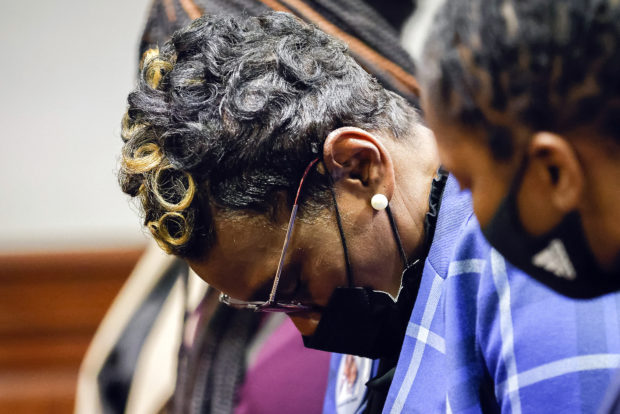Life in jail for killers of Black American jogger

Ahmaud Arbery’s mother Wanda Cooper-Jones reacts as Superior Court Judge Timothy Walmsley sentences Greg McMichael, his son, Travis McMichael, and a neighbor, William “Roddie” Bryan in the Glynn County Courthouse, on January 7, 2022 in Brunswick, Georgia. The McMichaels, and Bryan Jr. were sentenced to life in prison for the murder of Arbery, a 25 year-old black man as he ran through their south Georgia neighborhood. Travis and Gregory McMichael were sentenced without the possibility of parole. (Getty Images via AFP)
WASHINGTON – Three white men convicted of murdering African American jogger Ahmaud Arbery after chasing him in their pickup trucks were sentenced to life in prison Friday in a case that highlighted US tensions over racial justice.
Travis McMichael, 35, and his father Gregory McMichael, 66, were sentenced to life without parole, while their neighbor, William “Roddie” Bryan, 52, who had a less-direct role in the murder and cooperated with investigators, was given life with the possibility of parole.
The three were convicted in November of multiple counts of murder, aggravated assault and false imprisonment for chasing down 25-year-old Arbery on February 23, 2020 as he ran through their Satilla Shores neighborhood near Brunswick, in the southern US state of Georgia.
Pronouncing the sentence, Georgia Superior Court Judge Timothy Walmsley called the murder “a tragedy on many, many levels.”
Weighing the verdict, Walmsley said he kept thinking of “the terror of the young man running through Satilla Shores.”
Article continues after this advertisement“He left his home apparently to go for a run and he ended up running for his life,” Walmsley said.
Article continues after this advertisement“He was killed because individuals here in this courtroom took the law into their own hands.”
Nationwide anger
The Arbery case had added to a burst of nationwide anger and protests in 2020 over police killings and mistreatment of African Americans, sparked initially by the death in May that year of George Floyd in Minneapolis, Minnesota.
In June last year Derek Chauvin, the police officer who was filmed pressing his knee on Floyd’s neck until he lost consciousness, was sentenced to 22.5 years in prison for murder.
Three other now-former police officers who were at the scene will stand trial in March on charges of complicity in the homicide.
Cellphone video
Before the sentencing, members of Arbery’s family asked the court to give the three the harshest possible penalty.
“They each have no remorse and do not deserve any leniency,” said Arbery’s mother, Wanda Cooper-Jones.
“This wasn’t a case of mistaken identity… They chose to target my son because they didn’t want him in their community.”
“The man who killed my son has sat in this courtroom every single day next to his father. I’ll never get that chance to sit next to my son ever again, not at a dinner table, not at a holiday and not at a wedding,” said his father Marcus Arbery.
Graphic cellphone video taken by Bryan showed the armed men following Arbery in their trucks for about five minutes, suspecting with no evidence that he might have been a burglar.
Arbery repeatedly tried to avoid them, but was blocked by the trucks and then shot and killed by Travis McMichael.
The men claimed they were trying to make a “citizens’ arrest,” which was legal in Georgia at the time.
But a mostly white jury rejected that argument.
Prosecutor Linda Dunikoski called their actions “vigilantism.”
“Vigilantism always goes wrong,” she said Friday.
Speaking outside the courthouse after the sentences were pronounced, civil rights attorney Ben Crump, who represents members of Arbery’s family, said the case would not have been prosecuted without sustained pressure from the community.
“Think about all the Black people who have been lynched in the history of America, and Georgia, who never got their day in court,” he said.
The investigation into the original incident was stalled by local law enforcement for three months until the video was leaked, sparking national outrage.
A local prosecutor, Jackie Johnson, has been indicted for violating her oath of office and allegedly hindering the investigation into Arbery’s death.
The sentencing does not end the case, however. Besides the possibility of appealing the Georgia state case, the three men are also facing federal charges of civil rights violations in their pursuit and murder of Arbery.